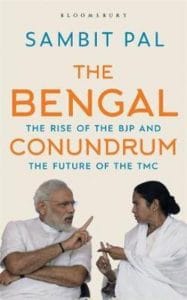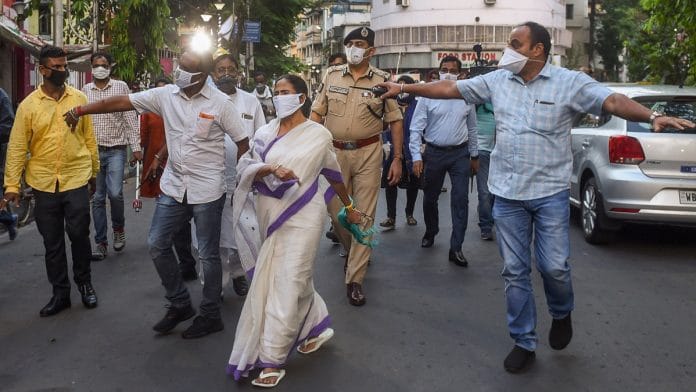Under Mamata’s rule, there has been a boost in infrastructure. Finance Minister Amit Mitra claims planned expenditure in the state has increased six times in the last eight years, while the capital expenditure in the state has increased eleven times.
Unfortunately, the manufacturing projects that Mitra mentioned could not generate massive employment opportunities and all these infrastructure projects and schemes, in a way, have also paved the way for corruption at the grassroots level since the TMC came to power in Bengal. Local party leaders would either grab the construction contracts or demand a hefty cut from the government enlisted contractors or they would extort money from the beneficiaries of the projects and welfare schemes. This corruption surfaced as the ‘cut money’ debate only after the ruling party was stung by the 2019 Lok Sabha election results.
What made the matter worse was that though these malpractices were reported time and again, Mamata Banerjee did not acknowledge these problems in public for the first eight years of her tenure. In a meeting with the TMC councillors of the civic bodies at nazrul Mancha in Kolkata on 18 June 2019, Mamata Banerjee accepted that there was corruption in her party while extending benefits of government welfare schemes and infrastructural projects. ‘In the “House for All” scheme [Banglar Bari], you will help them get the benefits and get 25 per cent commission, will the party tolerate this? We will not tolerate… From Samabyathi scheme, should you take ₹200 out of ₹2,000? I know some of you did it,’ she said.
However, as stated earlier, despite the reports of these extortions, Mamata Banerjee had not taken any strong, meaningful and long-term action. It was only after the Lok Sabha upset that she asked her party colleagues to return the ‘cut money’ they had taken from the people. ‘If you have taken it, return it. This is people’s money for the people and you have no right over the money,’ she said.
Mamata Banerjee failed to realize that this disease of ‘cut money’ could cause her electoral damage until the people taught her party a lesson in the Lok Sabha elections in 2019. ‘Her confidence that she would project herself as the candidate in all the seats and win elections did not work this time. It is true there has been a dent in her charisma,’ explains Suvashis Maitra.
Also read: ‘Will suffer Mamata misrule, not BJP’ — Bengal intellectuals don’t want another ‘poriborton’
It was for the first time that the people of West Bengal poured their anger into the EVMs, disgusted with the corruption of the local TMC leaders. The negative votes went to the kitty of the BJP. Mamata was so confident that her development and dole pitch would work as always that she failed to feel the pulse of the people. It was really strange to note that she, being a mass leader, could not read the people’s growing outrage.
Mamata’s failure to read the voters’ minds probably stems from her tendency to depend more on her police and administration than her own party colleagues.
In an administrative meeting in South 24 Parganas district in December 2018, Pratima Mondal, the TMC MP from Joynagar, told Mamata Banerjee, ‘There are some problems with the electricity in Kumirmari area in Gosaba.’ This area falls in Pratima Mondal’s constituency. Mamata asked her officer, ‘I think Gosaba’s electrification has been completed. Isn’t it?’ The officer nodded and the chief minister told her MP, ‘100 per cent electrification has been completed in Gosaba.’ The MP said nothing else. She silently went back to her chair. This has been a continued practice in Mamata’s administration—rely more on the words of the bureaucrats and the government officials than her own elected representatives.
In the same meeting, Baruipur (Purba) MLA Nirmal Chandra Mondal drew the chief minister’s attention at the new police station in his locality. Mamata Banerjee became furious. She told the MLA, ‘Only building cannot help. We need police personnel to make it running. You need to understand. I have recruited a lot [in the police force] in the last seven years.’ When Mondal interrupted the chief minister in a polite voice saying, ‘I am just placing my request, Mamata shouted over him, ‘no, you cannot place requests all the time. When we will get a chance, we will do it. Why do you keep on asking for more all the time. I haven’t heard you say we have got enough. The government is going crazy in formulating schemes after paying a debt of ₹48,000 crore. Centre is not cooperating. We have opened 149 new police stations and six new police commissionerates. nowhere in the country, it has been done.’
It is not unusual for a party chief or the chief minister to hold their party colleagues accountable for their mistakes or setting unachievable targets. But the way Mamata chides her MLAs and MPs in front of the administrative and police officials, especially on live television, undermines the person and their office in the eyes of the public and also the bureaucrats. This also shows how the administration overrules the party in power and the public representatives who are trying to raise the people’s issues. Sometimes Mamata may act as a ‘Santa Clause’ in such administrative review meetings and approve the demands of the public representatives, but the next moment she may lose her cool. It is difficult to gauge her mood. Like in one such meeting in West Midnapore, when an MLA asked for street lights on a bridge and a cold storage, the chief minister immediately approved it. Moments later, narayangarh MLA Pradyut Ghosh was lodging a complaint saying, ‘Since Public Works Department is not cooperating with us [in construction of a bus stand]’, Mamata was furious. She shouted at the MLA, ‘Do you cooperate with yourself? You tell me, you, Kausar, Mihirbabu and Surya [local TMC leaders]—do four of you cooperate with each other? Then you will blame PWD.’ no one had expected that the demand for a bus stand could irk the chief minister so much that she would bring up the party’s infighting in the administrative meeting.
Also read: Modi govt could send notices to 3 IPS officers and Bengal govt over deputation tug-of-war
While this tactic might be appreciated by many as Mamata apparently ‘teaching a lesson to political leaders’, but it is also true that she lets the bureaucrats and the police dominate over her party leaders.
During the Left Front rule, this was unimaginable. Under the Left, a zila parishad sabhadhipati (district board chief), who is an elected public representative, was considered to be the ultimate authority in the district. The district magistrate and the superintendent of police followed his orders. This established the supremacy of the political executives or elected public representatives who were accountable to the public.
‘It was possible in the Left rule because there was democratic centralism. Almost all the leaders would talk in the same line. Here, I think, Mamata depends more on the administrative officials for the reason that there has been so much of factionalism that she cannot trust her party colleagues. Moreover, she might have tried to use the expertise of the bureaucracy to run an effective government machinery in implementing her dream projects and schemes. She could not rely much on her party colleagues to do the same,’ says Suvashis Maitra.
What Mamata does not seem to realize is that the public representatives need to deal with the people directly and more frequently than bureaucrats. Government officials or the police may or may not be accountable to the public, whereas a political leader’s stake in public opinion is much higher. Moreover, public servants may shift their loyalties with the change of guard in the government.
Not only Mamata, but other TMC leaders also depend on the police and administration so much that there were rumours that the TMC top leadership had sent a list of candidates for panchayat elections in 2018 to the respective SPs of the districts to combat factionalism within the party. They had decided who would be allowed to file a nomination and who wouldn’t. According to some TMC leaders, in a Big Brother-like move, the government started tapping the phones of its own leaders. Many leaders and ministers shifted to WhatsApp call facilities to avoid their conversations being recorded.
The overuse of government and administrative machinery has eroded the local TMC leaders’ trust in their once beloved ‘Didi’, the moniker Banerjee claims. A leader from Bankura alleges, ‘The leaders from Kolkata would come and instruct the district police about what to do. They would not even listen to the local grassroots leaders. How can you expect
 This excerpt from ‘The Bengal Conundrum: The Rise Of The BJP And The Future Of The TMC’ by Sambit Pal has been published with permission from Bloomsbury India.
This excerpt from ‘The Bengal Conundrum: The Rise Of The BJP And The Future Of The TMC’ by Sambit Pal has been published with permission from Bloomsbury India.







There was little choice. The cadre of the earlier regime would have been worst to depend on than the police and admin.
These were the very goons who had brought about the regime change, to rely on them would have meant going back to the violence levels of 70s.
A leadership can remain in continuous election mode, it works, but to remain on the look out for adding targets to the HIT LIST obviously has not been a successful strategy.
Seeking confrontation, corruption, nepotism and dynastic endeavors being propagated through two and half English speaking so called intellectuals but sycophants, surely did not cut much ice with people.